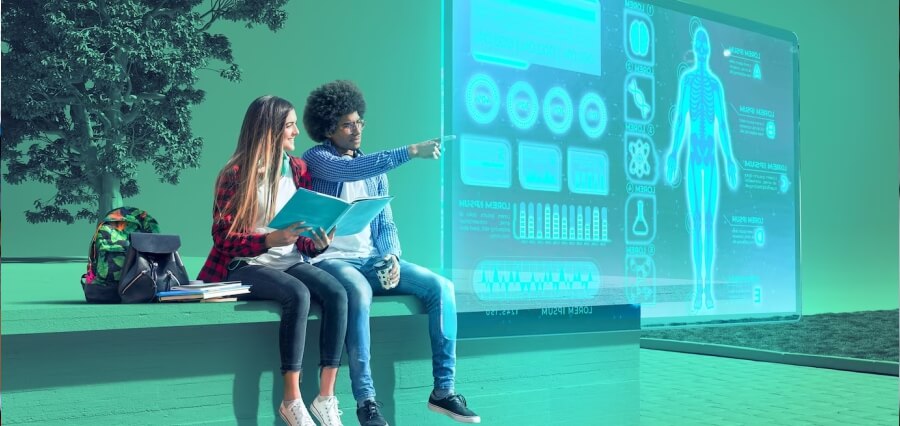In a world where technology changes quickly, Artificial Intelligence (AI) has become a key part of new ideas, especially in education. Around the world, college campuses are going through a big change. AI isn’t just adding to the learning setting; it’s changing it in ways that no one could have imagined before. But what does this union really mean, and how is it changing the future of college?
The Dawn of a New Educational Era
Personalized learning, an idea that has been the Holy Grail of education for a long time, is at the heart of this change. AI makes it possible to adapt learning to each person’s style and speed, which is something that could never be fully done with traditional teaching methods. But how exactly does AI make this personalized learning possible?
Limitations in Working with AI for Students
While AI presents an array of tools that can assist in the educational journey, it’s important to recognize the limitations, especially in contexts that demand personalization and originality. Crafting a paper or assignment manually in college, and particularly when submitting critical documents, holds unparalleled value. Reliance on AI for these tasks carries a high risk of refusal due to the potential lack of authenticity and personal touch. The personal statement writer service, however, stands as a testament to the importance of human involvement, ensuring a no-plagiarism paper, rich with human-written content and the expertise of professional writers. These attributes are crucial in creating submissions that not only meet academic standards but also reflect the unique identity of the student. Engaging with such a service empowers students to present work that is both authentic and aligned with their personal academic and professional goals, significantly reducing the risk associated with AI-generated content.
Personalized Learning at Its Best
Platforms and tools that are driven by AI can look at a huge amount of data from students’ learning activities and find patterns, strengths, weaknesses, and preferences. This data-driven approach lets course material, learning paths, and even assessment methods be changed to fit the needs of each student. This makes sure that every student gets an education that is both very informative and very interesting. Ever think about what it would be like if the things you use to study knew more about you than you knew about them? AI can do that in the classroom.
Enhancing Accessibility and Inclusivity
One of the most important things that AI has done for college education is level the playing field for all students, even those with disabilities. AI makes it possible to change educational tools to meet the needs of students who are deaf, hard of hearing, or have learning disabilities. This makes sure that all students have the same chances to learn. Think about a world where there are no more problems with learning. AI is making that world a reality.
Real-time Assistance and Feedback
Imagine having a teacher who is available 24 hours a day, seven days a week and ready to help or give feedback at any time. This is possible with chatbots and virtual assistants that are driven by AI and can help students outside of school hours. This not only makes learning better, but it also cuts down on the time it takes to answer questions, which makes the learning process smoother and less broken up.
ChatGPT and Essay Writing
The realm of academic writing is witnessing a revolutionary change with the advent of ChatGPT, transforming how students approach their essays and research papers. This advanced AI tool has become an indispensable companion for learners seeking to enhance their writing skills, providing insights and guidance throughout the writing process. With ChatGPT, the concept of an essay helper takes on a new dimension, empowering students to improve their writing quality while fostering a deeper understanding of the subject matter. This tool is not merely about generating content but about offering a platform where ideas can be refined and articulated more effectively. Students now have access to a resource that supports their academic journey by helping them craft essays that are coherent, well-structured, and insightful, thus significantly impacting their learning experience and academic performance.
Automated Administrative Tasks
Educators’ administrative duties can often get in the way of their ability to teach and connect personally with their students. Thanks to AI, things like marking, scheduling, and even keeping track of student attendance can be done automatically. This automation lets teachers focus on teaching instead of paperwork, which makes the whole learning process better for both students and teachers.
The Future of Creativity and Critical Thinking
AI takes care of routine administrative and learning tasks, so teachers can do more complicated, creative, and critical thinking activities with their students. This change not only gets students ready for the tasks they will face in the future workplace, but it also helps them learn “soft skills” like how to communicate, work as a team, and solve problems. But is there a bad thing about relying so much on AI?
Navigating the Challenges
AI is being used more and more in college classes, which has many benefits but also some problems. There are good reasons to be worried about data privacy, the digital divide, and the possibility of less face-to-face contact. These worries need to be carefully thought through and managed. It is very important to make sure that AI is used to improve schooling and not to replace people.
Conclusion
When AI is used in college, it changes the way people learn in ways that have never been seen before. It makes learning more specific, accessible, and efficient. The future of higher education looks not only bright, but also life-changing as we face the obstacles and welcome the opportunities. Using AI in education is still in its early stages, but one thing is for sure: college will never be the same again. Are we all set to start the revolution?





